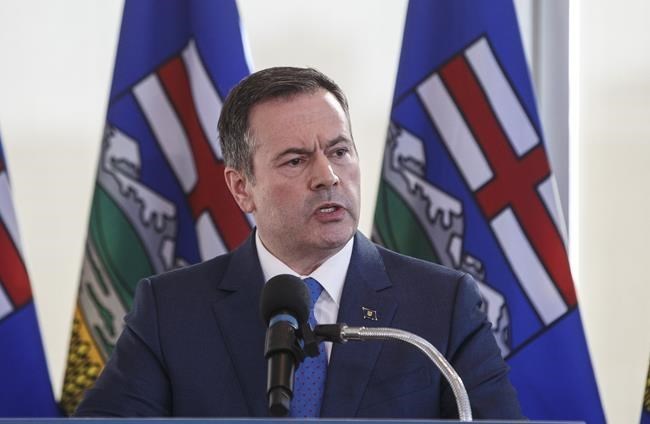EDMONTON — Alberta Premier Jason Kenney says he disputes comments made by his speechwriter in 2013 that questioned the severity of the effects of residential schools on Indigenous peoples, but is resisting Opposition demands to fire him.
"I fundamentally disagree with those statements," Kenney said Thursday, referring to excerpts from an article written by his speechwriter Paul Bunner before he was hired by the province.
Kenney said his government denounces the horrors of the residential schools and the institutionalized racism that supported them, adding that the best way forward is for everyone to work together and listen.
"I think we're all learning about, for example, the reality and legacy of the Aboriginal residential schools," said Kenney.
Kenney, asked twice by reporters to clarify Bunner's status, declined to say if Bunner would be removed from his position or sanctioned for the remarks.
Bunner was hired last year as Kenney's speechwriter and was a speechwriter for former prime minister Stephen Harper. The remarks were contained in an article he wrote seven years ago for the magazine C2C Journal.
Kenney said he wasn't aware of Bunner's statements on residential schools when he was hired.
The story came to light in a CBC story published earlier Thursday that prompted Opposition NDP Leader Rachel Notley to demand Kenney fire Bunner and publicly apologize for bringing him into his inner circle.
"The premier must address the profoundly racist views of his speech writer who called the residential schools experience of Indigenous people a quote 'bogus genocide story,'" Notley told the house.
"Thousands of children were killed and generations were traumatized. These words extend that trauma."
Kenney's office said Bunner is not doing interviews.
In the article, Bunner argued that the abuse and separation suffered by Indigenous students in Canada's residential schools have been overblown into a genocide.
Bunner adds that while there is no doubt there was abuse, non-native students also endured such hardships in boarding schools.
He also suggested some survivors and lawyers are trying to exploit the misery for money through government funds aimed at promoting healing.
"The bogus genocide story of the Canadian Aboriginal residential schools system is an insult to all of us, native and non-native, dead or alive, who are justifiably proud of the peaceful, tolerant, pluralistic history and values of our great country," wrote Bunner.
"We should fight like hell to defend it from those who would corrupt it."
Kenney noted the work his government has done to help First Nations, holding meetings with chiefs and creating the Aboriginal Indigenous Opportunities Corporation, which provides access to capital and technical support for investment in natural resource projects and related infrastructure.
A total of 150,000 Indigenous children are thought to have spent at least some time in a residential school over a century starting in the late 1800s.
They were government-sponsored religious schools designed to both educate and convert Indigenous youth and to assimilate them into Canadian society.
Last fall, the National Centre for Truth and Reconciliation, in a ceremony, revealed the names of 2,800 children who died in the schools.
The 2,800 are those whose deaths and names researchers have been able to confirm. Another estimated 1,600 also died, but remain unnamed.
There are also many hundreds who simply vanished, undocumented in any records so far uncovered.
In 2008, Harper's government made an historic public apology for the schools.
This report by The Canadian Press was first published June 25, 2020.
Dean Bennett, The Canadian Press



